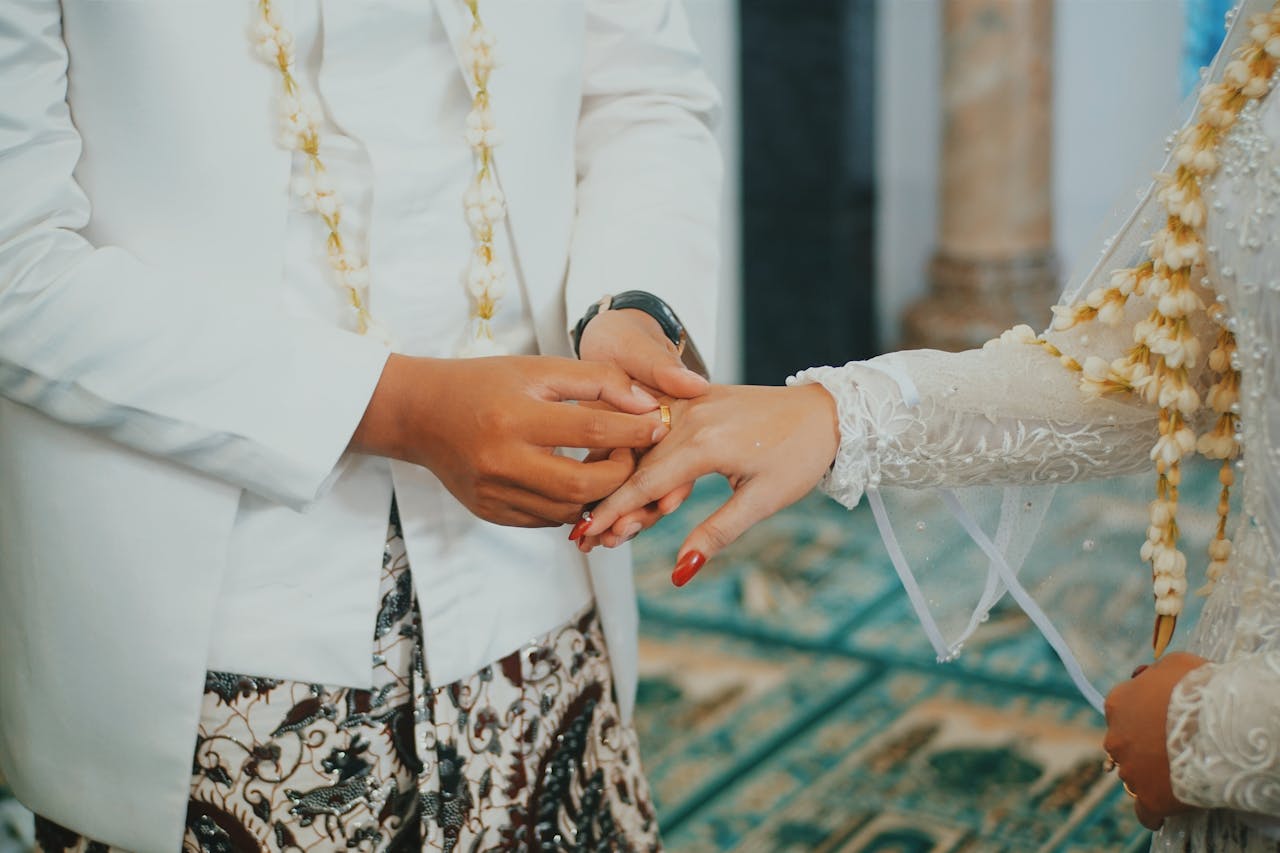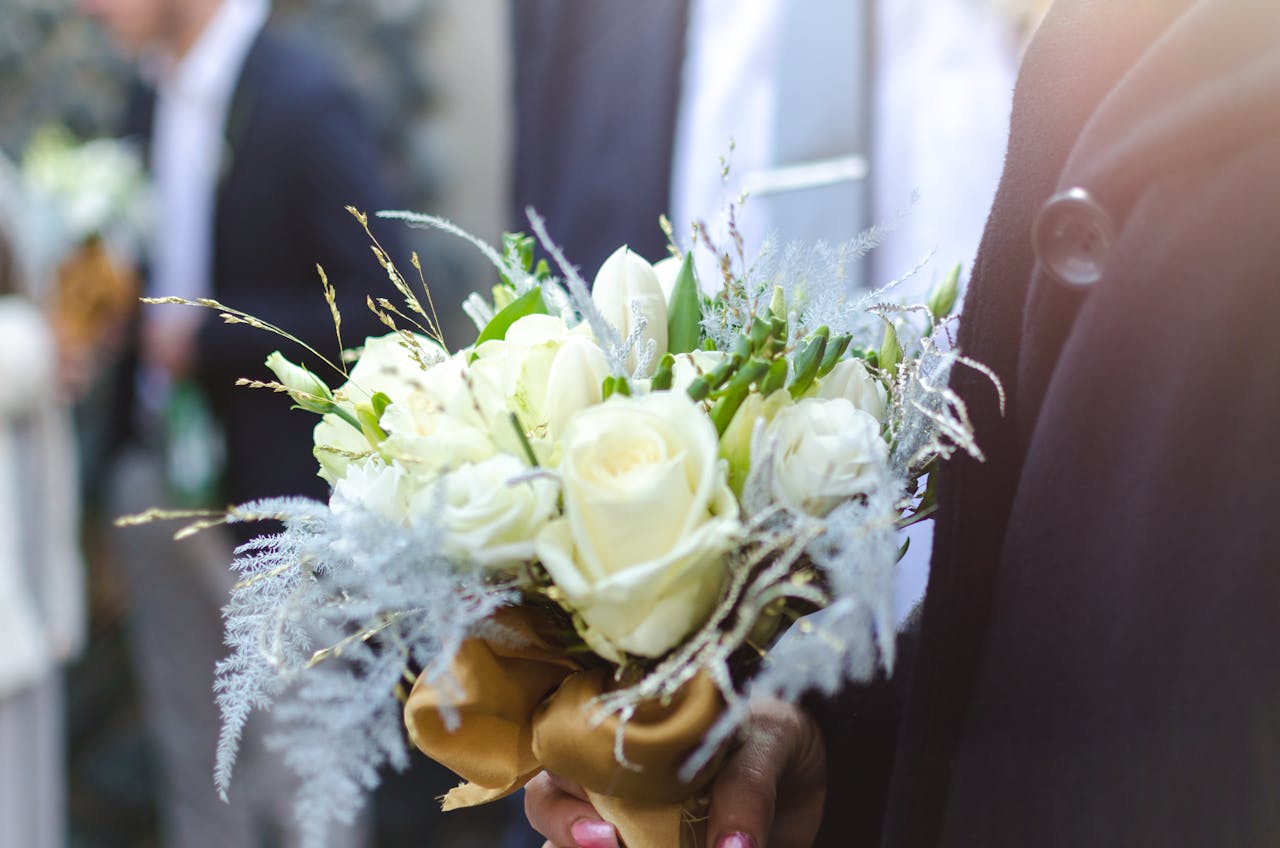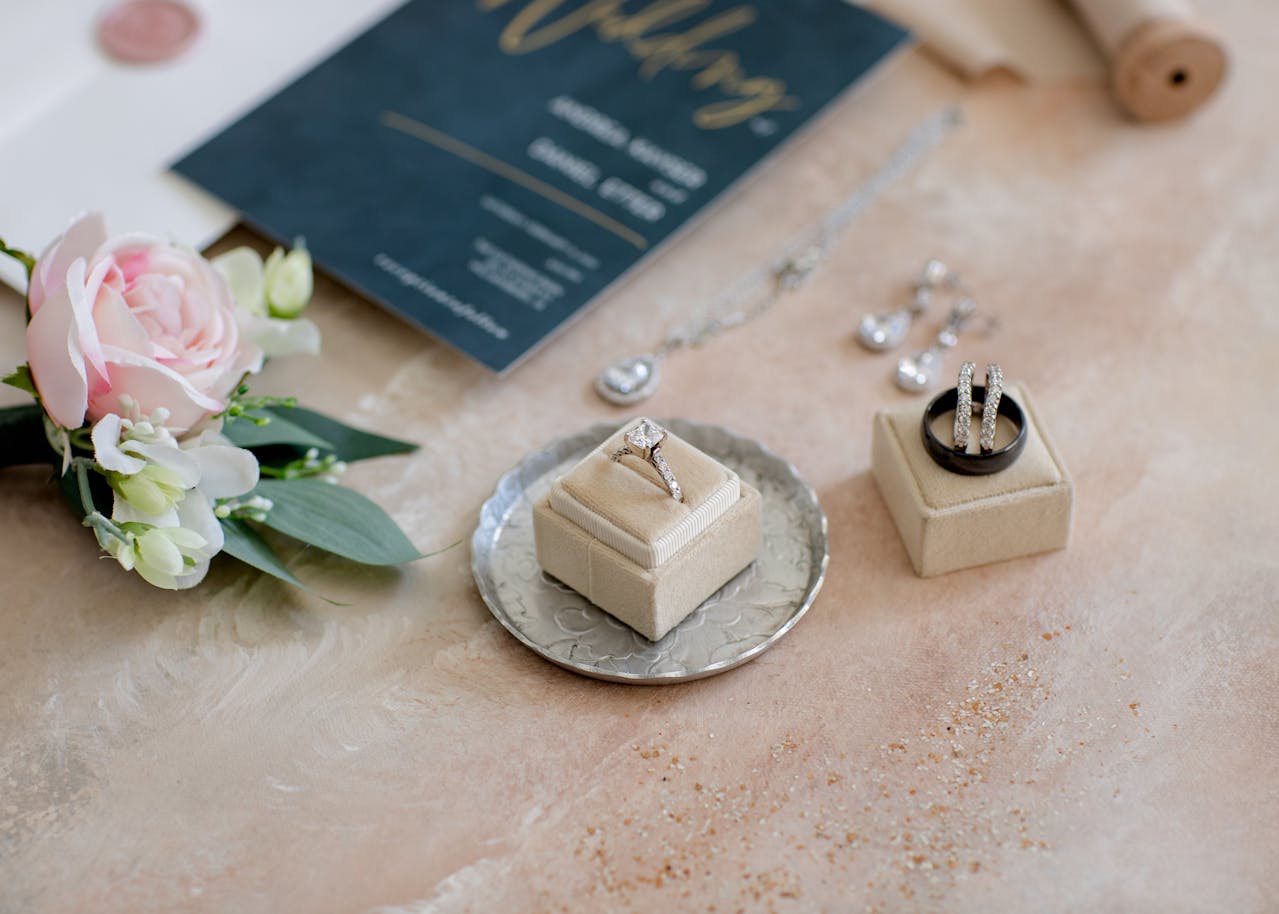
Marriage in the Month of Safar According to Javanese Primbon: Myths and Facts
The Month of Safar in the Hijri calendar is often associated with various myths and beliefs, particularly related to marriage. For some Javanese people, there is a belief that marrying in the month of Safar can bring misfortune or negative consequences for the couple. But is that really true? Let's delve deeper into the topic of marrying in the month of Safar according to Javanese primbon, as well as Islamic and scientific perspectives on this matter.
1. Understanding Javanese Primbon and Its Significance in Marriage

married (credit: pexels.com)
Javanese Primbon is a collection of traditional knowledge that has been passed down through generations in Javanese society. This book contains various calculations and predictions used as guidelines in various aspects of life, including determining the right time to hold a wedding.
In the context of marriage, Javanese primbon plays a very important role for some communities. They believe that choosing the right time to marry can influence the harmony and sustainability of the household in the future. Therefore, many couples who still adhere to this tradition will consult with elders or primbon experts before setting their wedding date.
The significance of primbon in Javanese marriage is not limited to selecting a good month. Primbon is also used to calculate the compatibility of partners based on weton (birth date according to the Javanese calendar), determine auspicious days for proposals, and various rituals and ceremonies accompanying the wedding process.
2. Myths Surrounding Marriage in the Month of Safar
There are several myths circulating in society regarding marriage in the month of Safar. Here are some myths that we often hear:
- Couples who marry in the month of Safar will often experience arguments and disharmony in their household.
- Marrying in the month of Safar can bring misfortune and calamity to the newlyweds.
- The economic life of couples who marry in the month of Safar will always be lacking and burdened with debt.
- Children born from marriages in the month of Safar will experience bad luck or difficulties in their lives.
- One of the partners who marry in the month of Safar is believed to die earlier.
It is important to remember that these myths have no scientific basis and often contradict religious teachings. These myths are more the result of inherited beliefs that may not necessarily be true.
3. Islamic View on Marrying in the Month of Safar
In Islamic teachings, there is no specific prohibition against marrying in the month of Safar or in other specific months. Islam teaches that marriage is an act of worship and can be performed at any time as long as the conditions and pillars are fulfilled. Here are some important points related to the Islamic view on this matter:
- There are no authentic hadiths that prohibit marriage in the month of Safar.
- Islam encourages making marriage easier, not complicating it with certain time restrictions.
- The success of a marriage depends on the faith, morals, and efforts of the couple, not on the timing of the ceremony.
- Believing in myths about the month of Safar can lead to superstitious practices that are forbidden in Islam.
Some scholars even emphasize that the Prophet Muhammad (SAW) married his daughter, Fatimah, to Ali bin Abi Talib in the month of Safar. This indicates that there is no issue in conducting a marriage during this month.
4. Scientific Perspective on Choosing the Time for Marriage

marriage (credit: pexels.com)
From a scientific perspective, there is no correlation between the timing of marriage and the success or failure of a household. The success of a marriage is more determined by factors such as:
- Emotional maturity of the partners
- Ability to communicate and resolve conflicts
- Financial and mental readiness
- Support from family and social environment
- Common vision and mission in building a household
- Ability to adapt and understand each other
Psychologists and marriage counselors emphasize that the main focus of couples should be on self-preparation and the relationship, rather than on choosing a time based on myths or certain beliefs.
5. Months Considered Good for Marriage According to Javanese Primbon
Although the month of Safar is considered unfavorable, Javanese primbon mentions several months that are considered good for holding a wedding. Here is an explanation of those months:
1. Month of Jumadil Akhir
Jumadil Akhir is the sixth month in the Hijri calendar and is regarded as one of the best months to get married according to Javanese primbon. Couples who marry in this month are believed to receive blessings in the form of abundant fortune and a harmonious household life.
The philosophy behind choosing the month of Jumadil Akhir is the belief that this month brings positive energy that can support the formation of a strong marital bond. Couples who marry in this month are expected to love each other sincerely, be faithful, and be able to overcome various challenges in their household wisely.
2. Month of Rajab
Rajab, the seventh month in the Hijri calendar, is also considered a very good time to hold a wedding. According to Javanese primbon, couples who marry in the month of Rajab will be granted safety, blessings, and ease in living their household life.
Additionally, the month of Rajab is believed to bring good fortune in terms of offspring. Couples who marry in this month are expected to be blessed with healthy and devoted children. The month of Rajab is also believed to bring success in the endeavors or businesses run by the couple.
3. Month of Ruwah
The month of Ruwah, also known as the month of Sya'ban in the Hijri calendar, is the eighth month considered good for marriage. Javanese primbon states that couples who marry in this month will receive peace, tranquility, and safety in their domestic life.
The philosophy behind choosing the month of Ruwah is the belief that this month brings strong spiritual energy. Couples who marry in the month of Ruwah are expected to build a household based on strong religious and moral values, thus avoiding slander and temptations that could damage their relationship.
4. Month of Dzulhijjah
The Month of Dzulhijjah is the last month in the Hijri calendar and is also considered a good time to hold a wedding. According to Javanese primbon, couples who marry in this month will receive blessings in the form of abundant sustenance and lasting happiness in their household.
The choice of the month of Dzulhijjah as a good time for marriage is also related to the momentum of the Hajj pilgrimage that takes place in this month. It is believed that strong spiritual energy during the month of Dzulhijjah can have a positive influence on couples starting their married life.
6. How to Calculate the Auspicious Month for Marriage According to Javanese Primbon
For those who still wish to follow the Javanese primbon tradition in determining the wedding date, here are the general steps that are usually taken:
- Determine the weton (birth date) of both prospective brides and grooms based on the Javanese calendar.
- Calculate the neptu (numerology value) of each prospective bride and groom's weton.
- Add the neptu values of both prospective brides and grooms.
- Match the sum with the primbon table to determine the auspicious month.
- Consider other factors such as unlucky days and market days.
It is important to note that this calculation process is quite complex and is usually performed by a primbon expert or elder who understands the intricacies of Javanese calculations. For those interested, it is advisable to consult a trusted expert.
7. Traditions and Rituals Accompanying the Selection of Wedding Dates

married (credit: pexels.com)
In Javanese culture, the selection of wedding dates is often accompanied by various traditions and rituals. Some of these include:
1. Nontoni
Nontoni is the initial stage in the matchmaking process, where the family of the prospective groom visits the home of the prospective bride to see and get to know her better. This process is usually conducted on a day considered auspicious according to primbon calculations.
2. Proposal
After nontoni, it is followed by an official proposal. In Javanese tradition, the proposal must also be conducted on a day and date deemed auspicious according to primbon calculations. This process involves the giving of a ring or other valuable items as a symbol of the bond.
3. Engagement
Engagement is a ceremony in Javanese customs, where both families exchange rings or other valuable items as a sign of the bond. The timing of the engagement is also chosen based on primbon calculations.
4. Siraman
Siraman is a bathing ritual performed one day before the wedding ceremony. This ritual symbolizes the purification of the bride and groom before entering a new life. The water used for siraman is usually mixed with certain flowers that are considered to have symbolic meanings.
5. Midodareni
Midodareni is the night before the wedding ceremony, where the bride-to-be remains in her room and is not allowed to be visited by the groom-to-be. This night is regarded as a time for introspection and spiritual preparation leading up to the wedding.
8. The Influence of Modernization on the Tradition of Choosing Wedding Dates
Along with the development of the times, the tradition of choosing wedding dates based on Javanese primbon has undergone various changes and adaptations. Some of the influences of modernization on this tradition include:
1. Flexibility in Implementation
Many young Javanese couples still respect the tradition but apply it more flexibly. They may still consult with primbon experts, but also consider practical factors such as the availability of reception venues or work schedules in determining the wedding date.
2. Integration with Technology
The development of technology has made it easier to access information about primbon and calculations for auspicious days. Many apps and websites provide services for calculating good days to marry based on Javanese primbon, although their accuracy is still debated.
3. Reinterpretation of Meaning
Some young couples try to reinterpret the meaning behind the tradition of choosing wedding dates. They may still follow the tradition, but with a more symbolic and philosophical understanding rather than a literal one. For example, they may see the process of choosing a date as an opportunity for reflection and mental preparation, rather than as a determinant of their marriage's fate.
9. Challenges in Preserving the Tradition of Choosing Wedding Dates
Although still firmly held by some in society, the tradition of choosing wedding dates based on Javanese primbon faces several challenges in this modern era:
1. Conflict with Religious Beliefs
For some people, the tradition of choosing wedding dates based on primbon is considered contradictory to religious teachings, especially Islam, which is the majority religion in Indonesia. This can create a dilemma for couples who wish to honor the tradition while also adhering to their religious beliefs.
2. Practical Difficulties
In a fast-paced modern life, it is often difficult to align wedding schedules with the months deemed auspicious according to primbon. This is especially true for couples who work or live outside their hometowns, where they must coordinate with leave schedules or venue availability.
3. Lack of Understanding
Many young generations have a limited understanding of the philosophy and meaning behind the tradition of choosing wedding dates. This can lead to the tradition being viewed as outdated or irrelevant to modern life. This challenge requires more intensive educational efforts and cultural preservation.
10. How to Address Differences in Perspectives on Choosing the Wedding Date

married (credit: pexels.com)
Considering the differences in perspectives regarding the tradition of choosing a wedding date, it is important for couples and families to approach it wisely. Some suggestions for addressing these differing views include:
1. Open Communication
Couples and families need to engage in open communication to discuss each other's views on this tradition. It is important to respect and understand the different backgrounds of beliefs or thoughts. Open and honest discussions can help reach an agreement that is acceptable to all parties.
2. Finding a Compromise
If there are differing opinions, try to find a middle ground that can be accepted by everyone. For example, continue to consider auspicious days as a form of respect for the tradition, but do not make it the primary determining factor in choosing the wedding date. Flexibility and compromise are often key in resolving differences in perspectives.
3. Focus on the Essence of Marriage
What is most important is to remind oneself that the essence of marriage does not lie in the choice of month or date, but in the commitment and love between the couple. Focusing on mental and spiritual preparation for entering married life is far more important than debating the best month to marry.
11. Conclusion
The tradition of choosing the wedding date based on Javanese primbon, including views on marrying in the month of Safar, is a cultural heritage that is still strongly upheld by some communities. Despite facing various challenges in the modern era, this tradition still holds deep meaning and philosophical value for those who believe in it.
However, it is important to remember that the success of a marriage is not solely determined by the choice of month or date. Factors such as mental readiness, emotional maturity, and the commitment of the couple are far more decisive in building a harmonious and lasting household.
For couples who wish to honor this tradition, it is important to interpret it wisely and not to make it a rigid dogma. On the contrary, the tradition of choosing the wedding date can be seen as one way to prepare oneself mentally and spiritually for entering a new chapter in life.
What matters most is how couples live their married life with love, understanding, and commitment, regardless of the month or date chosen for the wedding. With the right understanding and a wise attitude, tradition and modernity can walk hand in hand in building a happy and harmonious household.
(kpl/dhm)
Disclaimer: This translation from Bahasa Indonesia to English has been generated by Artificial Intelligence.

















